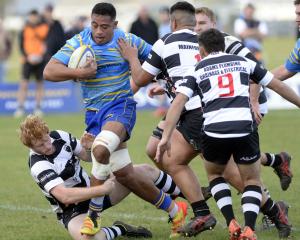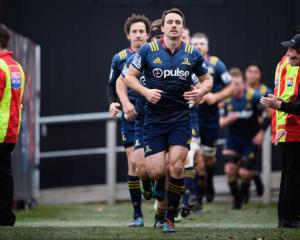
The wedding was rushed, the honeymoon was a little difficult, the early years were gloriously successful and after that . . . well, the less said about those years, the better.
And now, the end is near. Otago and the Highlanders, once barely distinguishable from each other but now dysfunctional partners in a faltering relationship, are to be cleft in twain.
Sweeping changes revealed yesterday include the establishment of a Highlanders management team that, for the first time, will be formally and almost entirely separate from the Otago Rugby Football Union.
A Highlanders general manager role has been created, replacing the chief executive role held by ORFU boss Richard Reid, and the new employees will be based away from Carisbrook.
It is the most significant development in the history of the Highlanders franchise, easily trumping the home final in 1999, the massive dispute between coach Laurie Mains and players in 2003, and the decision to avoid the draft where possible.
Why has it happened?
It all seemed so simple when New Zealand rugby joined the professional era in 1995 and created five franchises to play in the Super 12.
Those franchises were naturally established in the old "big five" unions: Auckland, Waikato, Wellington, Canterbury and Otago.
And it took some time for people to stop calling the franchise teams by their provincial names, and for nicknames like the Highlanders to catch on.
The franchises were dominated by the biggest of the unions underneath. So the Blues were essentially Auckland, and the Highlanders were very much just Otago with a token Southlander or two tossed into the mix.
The host provincial unions were contracted by the New Zealand Rugby Union, the 100% shareholder in the five teams, to run the franchises. In the Highlanders' case, this was great for Otago, because it could recruit new players simply by dangling a Super 12 contract in front of them.
But fast forward a few years and the lustre has been stripped right off the union-franchise arrangement, at least in Highlanders country.
Both are struggling on the field, both are bleeding money (a sort of salvage operation started this year, but millions of dollars have disappeared in recent years) and both have a public image that has suffered from years of battering.
Now, instead of seeing the link between Otago and the Highlanders as an obvious and sensible thing, it is seen as a drain on both. People are being forced to spread their ability and attention over dual roles, resources are diluted, and the ability of one team to get ahead is compromised by the performance of the other.
Perhaps the single biggest reason the split has emerged now is the expansion of the Super competition.
The Highlanders will effectively operate for nine to 10 months of the year. So it can be argued it is no longer realistic to expect the same people to run both the Highlanders and Otago.
The journey to segregation was well forecast. The NZRU, in a discussion document in 2008, supported "in principle" a move to independent management and operational structure of the franchises. The Chiefs and Waikato moved to separate chief executives years ago, and the other franchises are understood to be considering the move.
It is also barely 14 months since the NZRU took the steps of rejigging the Highlanders board and revealing a financial underwriting package to help the franchise stay afloat.
For ORFU chairman Wayne Graham, separating the union and the franchise - after some initial reservations - became the sensible choice.
"We had a certain amount of nervousness about letting go of the Highlanders at first. That was probably a parochial thing," Graham said.
"But there is no doubt the restructure will be beneficial for both parties. Highlanders people can focus entirely on the Highlanders, and Otago rugby people can focus entirely on getting Otago rugby to where it needs to get to."
Graham said there would still be some operational links between the two groups, including finance and accounts.
Otago would cut its financial ties to the Highlanders, who would have to pay their new employees out of their own budget. That would leave the ORFU to concentrate on taking care of its own business.
"The board now has to consider its own structure. We were getting paid a certain amount of money to provide services to the Highlanders," Graham said.
"Now we don't, so we're going to have to restructure our business to a certain extent. One of our priorities is being financially viable, which has been an issue in recent years.
"Then our focus will be on to develop our own players, start winning and be a breeding ground for the Highlanders."
Graham understands the new Highlanders employees will be based at the University of Otago clubrooms. Once the new stadium is built, both the Highlanders and the ORFU will look for space.
ORFU and, for a limited time, Highlanders chief executive Richard Reid will effectively lose half his job - and half his profile - as he prepares to focus entirely on Otago rugby.
Holding both jobs was difficult and he was pleased the NZRU and the three provincial unions within the Highlanders had blessed the separation.
"There are too many parts of the role where you are busy at the same time. You are doing Highlanders reviews and contracting and coaching and playing and commercial issues, at the same time as the ITM Cup starts," Reid said.
"That's just the way it works. Your calendar is conflicted all the time.
"The theory behind splitting the roles is it will allow both to function better."
Reid did not think the joint operational structure could be blamed for Otago or the Highlanders struggling on and off the field.
He said it was impossible to neatly identify how many dual-purpose employees the ORFU had, or what percentage of time and resources those employees had been devoting to the two organisations.
"Otago has a management contract. The Highlanders have never employed anyone till now.
"Otago rugby has employed people to work for the Highlanders. So it's not quite cut and dried.
"This new structure will make it quite clear. The Highlanders have employees, and some parts of Otago rugby will continue to be a shared resource."
Reid's Southland counterpart, Roger Clark, now seems likely to become the most important man in Highlanders country.
Well regarded for the job he has done in Invercargill, Clark was seconded by the NZRU to spend three months with the Highlanders this year as project manager. He will stay in that role until the general manager role is filled, possibly by himself.
"I think it's pretty exciting times. There are a lot of changes going on in rugby and all the franchises are looking at their structures," Clark said.
"We've got an opportunity down here to get back in the game, to steal a march on our competitors up north.
"This is something a little bit innovative. It's a structure that suits our region and will take both the franchise and the unions forward in a positive way."
Clark will leave his Southland role if he is appointed Highlanders general manager. His new status, following the selection of plenty of Stags and the appointment of assistant coach Simon Culhane, should further mollify those in the Shield province who still feel they have been undervalued over the years.
Removing the Highlanders from ORFU control had nothing to do with Southland discontent, real or imagined, Clark said. He thought Southlanders did embrace the Highlanders.
"It's about on- and off-field performance, not people's perceptions. The bottom line is the Highlanders have to start performing. Otago are doing a bloody good job, in my view, of turning things around.
"This will help continue that work. But obviously we needed to make some changes because what has been done in the past hasn't worked."
Graham is quite open about his organisation's future - now that it is free of its Highlanders commitments, Otago wants to use the Southland model as a shining example.
"They've got on and looked after themselves. They haven't had to focus on the Highlanders.
"We've been spending a lot of time talking about the Highlanders, and then Otago, and then the Highlanders again.
"Now Otago rugby can simply say, 'right, what do we need to do for ourselves?' It allows us to have a very clear focus. We've spent a lot of time being reactive. Now we can look to the future."












